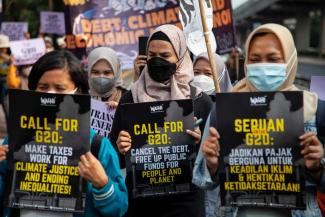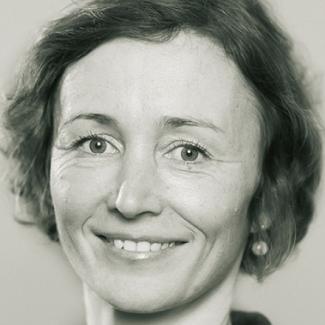Global development
Facilitating constructive cooperation in a multipolar world
 picture-alliance/NurPhoto/Aditya Irawan
Civil society matters: activists demanding action from G20 in Jakarta in 2023.
picture-alliance/NurPhoto/Aditya Irawan
Civil society matters: activists demanding action from G20 in Jakarta in 2023.
Germany’s Federal Ministry for Economic Cooperation and Development (BMZ) was established in 1961. Back then, many partner countries had just become independent while others were fighting for it. Since then, the bipolar order of the 1960s to 1989 has given way to a more complex and dynamic world. Besides the historical powers such as the US, Russia and the EU, leading economies, such as China and India, and regional powers, such as Brazil, Indonesia or South Africa, are shaping economic and political interdependencies.
The possibilities of how future might look like – in economic, social, environmental and cultural terms – are more diverse. It is the interplay and amalgam of many different ‘sustainable futures’, each a contextualised version of the necessary foundations for human life on earth and within our planetary ecological, social, political and economic boundaries. Together these different imaginaries of future guide actors in their decisions and steps taken towards them.
The democratically organised market economy sees itself in opposition to a multitude of different political regime types. Wars are destabilising world regions. Russia’s war of aggression in Ukraine continues. The Gaza war may yet spread across the whole Middle East. Violent strife is destabilising entire societies as in Ethiopia, Yemen or the Sahel region.
At the same time, debt crises in a number of low- and middle-income countries and the climate and biodiversity crisis are leading to a lack of social security. People’s ensuing desperation makes them susceptible to authoritarian agitation. The recent collapse of political order in Haiti is ominous.
In this difficult context, it is worth revisiting: What is ‘development’? How and by whom can it be brought about? And what institutional landscape does multipolar cooperation require?
1. The Meaning of ‘development’
Development understood as sustainable development and thus the promotion and safeguarding of the global common good was defined in the Sustainable Development Goals (SDGs) and the UN 2030 Agenda in 2015. It is centred on every human being’s right to self-determination, for example, the emancipatory freedom to act. It is a challenge that is particularly daunting in countries with low per capita incomes, while the obligation to safeguard our planet’s health rests especially with those countries that have a track record of endangering it.
Germany’s system of international cooperation for sustainable futures is founded on providing support and shaping reciprocal partnerships amongst equals, with equal rights and common but differentiated responsibilities. These are partnerships with countries of all income groups, including the OECD, and neither characterised by an attitude of helping, nor geared to a logic of ‘othering’ and boundary drawing. Instead, they are focused on devising and pursuing sustainable futures within our planetary boundaries. Partnerships and collaborations are founded on human rights and, ideally, shared democratic and liberal values.
Development does not follow on automatically from economic growth or fighting poverty. It emerges from processes of building sustainable futures. In other words, development is not possible until absolute poverty has been eradicated and social, political, economic and cultural participation made possible.
And while futures differ depending on context, they are only possible, if human life on earth and within our planetary boundaries is ensured. Development thus must be sustainable. This universal challenge has implications for global cooperation and global governance. Both must be shaped in ways that enhance opportunities at the local level and facilitate sustainability at the global one – in a socially just manner.
2. How to build sustainable futures
Making these futures sustainable, as set out in the United Nations’ 2030 Agenda and the German Sustainable Development Strategy, is a cross-scalar, multi-sectoral mandate that spans internal and external policy fields, civil societies and public and private sector actors. It can only be achieved through close collaboration between the various ministries and decision-making levels (local, regional, national, global) and the spheres of policymaking, the economy and society.
Policymaking for sustainable development and futures in the 21st century thus has to adopt a planetary and collaborative perspective and foster dialogue with local communities on a transregional scale. The aim is to protect the global commons, including, for example,
- social equality and the eradication of poverty,
- peace and political participation,
- healthy ecosystems and a stable climate,
- pluralism and cultural diversity.
Key political levers include: a sustainable structure for the financial markets; robust social security, food and healthcare systems; strengthening education, science, research and innovation development, including institutions for global social cohesion; an international rules-based order; and promoting regional and multilateral cooperation and peace.
Development policy and international cooperation in itself cannot operate all of these levers alone, but instead utilises them and contributes to their effectiveness. Ideally, the focus here lies on transformative structural policymaking for sustainable development with a focus on building the institutional, technological and infrastructural preconditions for mid- to long-term change.
The focus of the international cooperations at hand is typically determined via government negotiations beforehand. Then agencies that specialise in international cooperation implement measures, accordingly, relying on a broad range of formats and instruments.
Current policy examples include the “Just Energy Transition Partnerships,” which Germany and other donor governments have concluded with South Africa and Indonesia, among others, providing support for “transitioning away from fossil fuels”, as agreed on at the climate negotiations in Dubai 2023. Germany is also involved in finding political solutions to the conflicts in Ukraine, Gaza and the Sahel region. That is obviously most difficult, but nonetheless results in agency mandates for action, for example regarding the provision of humanitarian relief or supporting civil-society organisations – especially where state-based cooperation is becoming increasingly difficult.
3. Global governance and multilateralism
Our world is characterised by global crises ranging from the climate and biodiversity crises to debt crises, war, social polarisation and political autocratisation processes in countries of all income groups and on all continents. The international order is shifting.
Today’s policymaking will decide whether constructive cooperation stays possible in a multipolar world. The dangerous alternative is fragmentation, with the international community splintering into multiple, competing orders.
Yet, we only have one planet. Its health determines our future. We therefore need a multilateral system in which difference can be voiced, compromise sought and consensus built, so the international community will find joint answers to our most pressing global challenges. Germany, the EU and the world are well advised to invest – politically, financially and intellectually – in multilateral institutions, ranging from the UN to the multilateral development banks and from the World Trade Organization to the G20 as platforms of geographically diverse representation.
At the same time, the existing multilateral structures were largely set up after World War II. Reforms are needed to make them fit for today’s purposes. Their governance structures typically do not mirror the reality of our multipolar world. This has to change in order to assure full acceptance of the structures by all, as well as the ability to stand united where global challenges hit. The only alternative, a world fragmented in multiple and competing orders, is a world that loses the race against climate change and biodiversity loss, social polarisation and political autocratisation.
In addition, non-state forms of international cooperation gain further importance in a world where democratic governance systems that ensure freedom of expression and speech are at risk. These include international cooperation between civil-society organisations and science systems. Examples for the later include the Intergovernmental Panel on Climate Change (IPCC), the Intergovernmental Science-Policy Platform on Biodiversity and Ecosystem Services (IPBES), Belmont Forum and Future Earth or the Think20 group of think tanks.
Development policy and international cooperation is indeed about cooperating in a world in which the forces at hand are divisive rather than uniting. It is about the desperately needed transformational pathways towards many locally contextualised and realised sustainable futures and one common future – united in diversity – for human life on earth.
Anna-Katharina Hornidge is the director of the German Institute of Development and Sustainability (IDOS) and professor of global sustainable development at the University of Bonn.
anna-katharina.hornidge@idos-research.de


